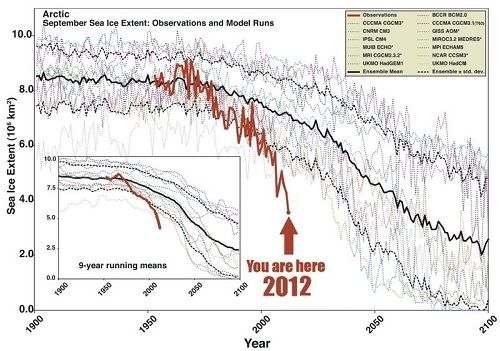Sharing Our Beliefs on Global Warming, Environmentalism

Where it got interesting was when I happened to mention my take on the environmental picture as a whole, i.e., that our current consumption of energy resources, coupled with the growth of the urbanizing world population, is not sustainable.
Here, the caller jumped into a Cato Institute-like dismissal of the subject. For about 10 minutes, he laid into me with concepts that included the hijacking of US environmental groups with former USSR communists hell-bent on destroying capitalism, the global warming hoax, and so forth.
I didn’t argue, and I didn’t even try to cut him off. I was, however, a bit stunned that this guy, apparently young, bright, well-educated, and successful, would lay this fairly radical viewpoint onto a total stranger. To me, this was “man bites dog.”
Eventually, I amiably acknowledged what he had said, and told him that I was extremely familiar with these concepts. “From the many thousands of people I’ve spoken with in countries all over the world over the years, trust me, I’ve come across all that — and more. You’re probably aware that your ideas aren’t shared by the majority, but that doesn’t make them wrong.” I try to be the model of diplomacy in cases like these; there’s really no reason to act otherwise.
Speaking of the global warming “hoax,” here’s what the size of the arctic ice sheet looks like today, compared to predictions that were made just five years ago.


Craig,
It’s important to qualify what is “believed” and what is “understood”. The two are not the same.
I posted this in a conversation on another website the other day:
I don’t really have a problem with anyone arguing for greater or lesser warming rates due to X or Y feedback mechanism… so long as they are willing to concede if their postulates on certain feedback mechanisms are debunked. The problem arises when someone chooses to say they “don’t believe” in the underlying mechanism that is being studied here. We understand more than enough about radiation and energy balance to move past that question.
The jury came back on the impact of greenhouse gas concentrations in the atmosphere. Re-fighting a fully understood mechanism regarding radiation absorption and blackbody energy release and the basic functions of energy balance… This is not an efficient use of anyone’s time.
To illustrate:
If you think there is not compelling evidence that there is a danger of very significant accommodation costs due to increased CO2, that’s something that I disagree with and will debate, but there is no anti-science sentiment expressed here.
If you think that renewable energy technologies are far more costly than could ever be justified by the potential accommodation costs projected from AGW, then I would agree wholeheartedly with a few specific exceptions (chief among them being wind in high class wind regions, hydro in situations where there is an agricultural, flood mitigation, or water conservation concern that justifies the dam, and of course WindFuels – though there are a few others). But again, there are sufficient uncertainties to warrant opinions here, and neither side in this type of debate is rejecting scientific fact.
However,
To say “I don’t believe that GHG concentration increases result in higher temperatures” is stating that you doubt the reproduce-ability of energy physics with respect to radiation absorption, emissions, and energy balance in the singular case of Planet Earth. In that case the stated “belief” is a nonsense position. We KNOW that the energy must balance (law of conservation of mass and energy), and we KNOW that GHG’s absorb infrared energy, and we KNOW that blackbody emissions at ~300 K are within the infrared spectrum, and we KNOW that at certain temperatures there are specific blackbody emission power/area rates, and we KNOW the only way the power level of blackbody emissions can increase is if the temperature increases or the area increases. These facts are not refutable.
Which means the only other possible outcome of increased GHG concentrations (other than an increase in the average planetary temperature) involve the Earth continually gaining mass… and I don’t think anyone has articulated a postulate that involves THAT occurring.
🙂